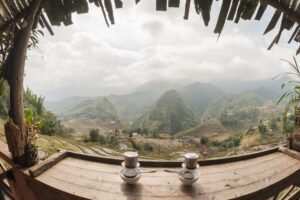Coffee lovers all over the world can’t resist the rich aroma and bold flavors of Vietnamese coffee. However, have you ever wondered about the environmental consequences of producing this beloved beverage? In this article, we will take a closer look at the environmental impacts of Vietnamese coffee production. From deforestation to water pollution, we’ll explore the challenges faced by this thriving industry and the potential solutions for a more sustainable future. So grab a cup of joe and join us on this journey of discovery!
Deforestation
Deforestation is a significant issue associated with Vietnamese coffee production. The conversion of forests to coffee plantations has resulted in the clearing of vast areas of land. This process not only destroys the natural habitats of countless plant and animal species, but it also contributes to the loss of biodiversity in the region. Forests are complex ecosystems that support a wide variety of flora and fauna, and their destruction disrupts the delicate balance of these ecosystems. Additionally, deforestation leads to the loss of carbon sinks, contributing to the accumulation of greenhouse gases in the atmosphere.
Water Pollution
Water pollution is another environmental concern associated with Vietnamese coffee production. The use of agrochemicals such as fertilizers and pesticides in coffee farming can lead to chemical contamination of water sources. These substances can enter rivers, lakes, and groundwater, posing risks to aquatic life and potentially contaminating drinking water supplies. Additionally, the processing of coffee beans can result in runoff containing pollutants from the facilities, further exacerbating water pollution issues.
Soil Degradation
The excessive use of fertilizers and pesticides in Vietnamese coffee cultivation poses a threat to soil health. While these inputs may provide short-term benefits in terms of increased yield, they can lead to the loss of soil fertility over time. The reliance on chemical inputs inhibits the natural processes that contribute to soil fertility, resulting in degraded soil quality. Furthermore, deforestation associated with coffee production can lead to soil erosion, as the removal of trees leaves the land susceptible to the impact of heavy rains and wind.
Climate Change
Vietnamese coffee production contributes to climate change through various means. The greenhouse gas emissions associated with the entire coffee production process, including cultivation, processing, and transportation, contribute to global warming. Additionally, deforestation, a consequence of coffee plantation expansion, leads to the loss of carbon sinks. Forests naturally absorb and store significant amounts of carbon dioxide, a major greenhouse gas. The loss of these carbon sinks further contributes to the accumulation of greenhouse gases in the atmosphere. The impacts of climate change, such as extreme weather events and changing precipitation patterns, can have significant consequences for both the local and global climate.
Water Scarcity
The high water consumption involved in Vietnamese coffee cultivation contributes to water scarcity in the region. Coffee plants require a substantial amount of water, and the expansion of coffee plantations has put a strain on local water resources.
This has led to increased competition for water, not only among coffee farmers but also with other sectors and communities that rely on the same water sources. As a result, water scarcity can have detrimental effects on local agriculture and communities, impacting their livelihoods and food security.
Energy Consumption
The production and processing of coffee beans require a considerable amount of energy, resulting in increased electricity consumption. Coffee processing facilities utilize energy-intensive machinery to sort, roast, grind, and package the beans.
Additionally, the transportation of coffee beans from farms to processing facilities, and eventually to consumers, contributes to the carbon footprint of the industry.
The reliance on fossil fuels for energy generation further exacerbates the environmental impact of Vietnamese coffee production.
Waste Generation
Vietnamese coffee production generates significant amounts of waste that pose environmental challenges. Coffee pulp and husks, byproducts of the processing stage, require proper disposal to prevent adverse effects on the environment. If not managed appropriately, these organic wastes can release large amounts of methane, a potent greenhouse gas, contributing to climate change.
In addition, the packaging of coffee products often results in waste that can be challenging to recycle or properly dispose of, leading to further environmental implications.
Pesticide Use
The use of pesticides in Vietnamese coffee farming can have detrimental effects on the environment and human health. Pesticides are commonly used to control pests and diseases that can affect coffee plants, but their application can result in unintended consequences.
Pesticides may harm beneficial organisms, including pollinators, and contaminate surrounding areas through runoff.
This poses risks to local ecosystems and can potentially affect the health of both coffee farmers and nearby communities. Implementing sustainable practices and exploring alternatives to conventional pesticide use is crucial for mitigating these environmental and health risks.
Social Impacts on Coffee Production

Vietnamese coffee production also has social implications, particularly regarding working conditions on coffee farms. Many coffee farmers face challenging working conditions, including long hours and low wages.
Fairtrade initiatives and labor rights advocacy play an essential role in addressing these issues, ensuring that coffee farmers receive fair compensation for their labor. Additionally, the expansion of coffee plantations can lead to the displacement of indigenous communities, disrupting their traditional livelihoods and cultures.
Promoting sustainable practices that prioritize the well-being of farmers and respect for indigenous rights is vital for fostering a more equitable coffee industry.
Sustainable Practices
Implementing sustainable practices in Vietnamese coffee production is crucial for minimizing its environmental impact. Certifications and standards, such as organic and fair trade certifications, provide guidelines for more sustainable farming practices.
Adopting agroforestry and shade-grown coffee methods can mitigate deforestation, promote biodiversity, and enhance soil health. Efficient water and energy management strategies, such as drip irrigation and the use of renewable energy, help reduce water consumption and decrease the carbon footprint of coffee production.
By prioritizing sustainability, the Vietnamese coffee industry can contribute to the conservation of natural resources and the well-being of the communities involved.
Hi, I’m Lin, a lover of Vietnamese coffee and the author of VietCafeVibes.com. I created this website with a mission to bring you the ultimate coffee experience. Here, I celebrate the vibrant world of Vietnamese coffee and offer an authentic glimpse into its rich culture. Let’s indulge in the magic of Vietnamese coffee together!
